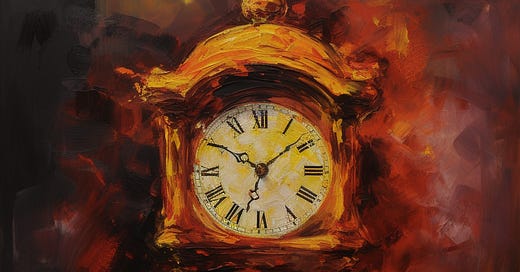What is time? How do we utilize it? Are we spending it wisely?
These are all questions we continuously, in one way or another, ask ourselves either consciously or unconsciously as we progress through life. Most of us think of time as the clock on the wall or the 24 hours in a day. Others look at it as we’re here on earth for a limited time—an unknown amount—and try to make the most of it. (And a good majority of us try to ignore this same fact.)
Time is a drum that continues to beat for us and yet we never really stop and think about what it is.
When we think about this thing we call time, however, we come to realize that it is the things we do. When we take a step back and look at time, we often don’t think of time itself but rather the things we do with our time. We sleep six to eight hours a day, we commute an hour to work, we spend a good amount of time, eight or more hours a day, working. We think of this abstract idea of time not in the idea of time itself but in the things we fill time with.
One reason for this is we are extremely adaptable and novelty for us quickly turns to habit and routine. It’s amazing to see a shooting star but be somewhere where you see them every night and its charm quickly runs its course.
We start living life and quickly fall into line with our experiences, ourselves becoming part of the experience itself. Starting a new job, driving the new commute, these are all interesting and (possibly nerve-wracking) but after a week or so, we know what we’re doing and it becomes routine. All our actions eventually devolve into patterns and the nuances of our actions that were once unique become routine — in the process, we lose our own uniqueness to the existence of these routines.
And life is set up to be exactly this.
It is set up for one after another to get in line, to do their job, to trade time for money. As we progress through life like this, the one thing we wish for — freedom — is slowly and unknowingly removed from us because we fall into these routines.
We have a finite amount of time and within that time we have a finite amount of choices we can make about how best to utilize that finite amount of time.
It is not that we need to quit our jobs or have a life altering decision to regain our freedom. Rather, it is the recognition of the fact that we are living with an unknown finite amount of time and fill that with a finite amount of choices that we take back our freedom. It is through this that the monotony of autopilot begins to disappear, because we have suddenly broken free of routine and instead taken on a deeper lens of the world and our lives, one that forces us into the present moment, and makes us consider how we actually want to utilize our time.
And this is what Seneca meant 2,000 years ago when he said:
“Everyone hustles his life along, and is troubled by a longing for the future and weariness of the present. But the man who spends all his time on his own needs, who organizes every day as though it were his last, neither longs for nor fears the next day.”
Life—time, hustles along, and we find ways to preoccupy ourselves with “living” without ever stopping to consider how it is we are in fact living.
Or, as the philosopher Martin Heidegger put it 2,000 years after Seneca:
“We reach out towards the future while taking up our past thus yielding our present activities. Note how the future — and hence the aspect of possibility — has priority over the other two moments.”
By bringing our attention back to the fact that we have a finite amount of time, and we actively engage the choices we’re making to occupy that time, we regain power not only of our lives but of what we want out of them. We no longer ignore time, nor do we let it briskly fly by. As Marcus Aurelius said, time is an ever flowing river. But by bringing our attention to the river, we’re better able to see it, where it flows, and how we want to fish in it.
Thank you for reading Mind Candy. If you feel someone can benefit from this, please pass it along using the link below (there are free books for doing so).
Thank you again for reading and I hope you found this useful. Please feel free to heart, comment, or ask questions about this post. Suggestions are always appreciated and considered.
Until next week,
D.A. DiGerolamo






A very breathtaking read...